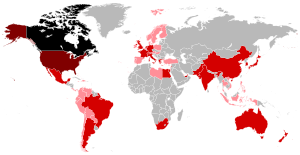ชาวแคนาดา
 | |
| ประชากรทั้งหมด | |
|---|---|
ป. 39,803,126[1][2]
 | |
| ภูมิภาคที่มีประชากรอย่างมีนัยสำคัญ | |
| ชาวแคนาดาพลัดถิ่น | |
| 1,062,640[3] | |
| 300,000[3] | |
| 73,000[3] | |
| 60,000[4] | |
| 45,000[3] | |
| 40,000[5] | |
| 27,289[3] | |
| 19,990[3] | |
| 17,320[6] | |
| 15,750[7] | |
| 14,210[3] | |
| 11,016[3] | |
| 10,000[3] | |
| 9,816[8] | |
| 7,770[3] | |
| 7,500[3] | |
| 6,000[3] | |
| 5,243[3] | |
| 5,140[3] | |
| 5,000[3] | |
| 5,000[3] | |
| 4,145[3] | |
| 2,559[9] | |
| ภาษา | |
|
| |
| ศาสนา | |
| ส่วนมาก: 38.8% คริสต์นิกายโรมันคาทอลิก, 23.9% ไม่มีศาสนา และ 20.3% คริสต์นิกายโปรเตสแตนต์ ส่วนน้อย: 3.2% อิสลาม, 1.5% ฮินดู, 1.4% ซิกข์, 1.1% พุทธ, 1.0% ยูดาห์ และ 0.6% อื่น ๆ[11] | |
ชาวแคนาดา (อังกฤษ: Canadians; ฝรั่งเศส: Canadiens) หมายถึงบุคคลจากประเทศแคนาดา โดยความหมายนี้อาจสื่อถึงทางพันธุกรรม, ที่อยู่อาศัย, กฎหมาย, ประวัติศาสตร์, วัฒนธรรม หรือชาติพันธุ์ สำหรับชาวแคนาดาส่วนใหญ่ บ่อยครั้งมักจะสื่อถึงการดำรงอยู่และแหล่งที่มาของพวกเขาเพื่อการพิจารณาว่าเป็น ชาวแคนาดา
นอกเหนือจากชาวอะบอริจินอล ที่ปรากฏตามสำรวจสำมะโนประชากรใน ค.ศ. 2006 ที่มีอยู่ 1,172,790 คน ซึ่งถือเป็น 3.8% ของประชากรทั้งประเทศ[12] ซึ่งเป็นประชากรส่วนใหญ่ที่อพยพมาจากโลกเก่ารวมถึงลูกหลานของพวกเขา หลังจากการเป็นส่วนหนึ่งของจักรวรรดิอาณานิคมฝรั่งเศสในช่วงแรก และจักรวรรดิบริติชในช่วงต่อมา คลื่นฝูงชนที่อพยพและตั้งถิ่นฐานจึงไม่ใช่ชาวอะบอริจินอลเป็นหลัก และเป็นเช่นนี้มาเกือบสองศตวรรษจนถึงปัจจุบัน องค์ประกอบของชาวอะบอริจินอล ชาวฝรั่งเศส และชาวอังกฤษ, รูปแบบการย้ายถิ่นฐาน, ภาษา และศาสนาได้หล่อหลอมรวมเป็นรูปแบบวัฒนธรรมแคนาดา และก่อให้เกิดเอกลักษณ์ของแคนาดา แคนาดายังได้รับอิทธิพลอย่างมากในด้านภาษาและเศรษฐกิจจากประเทศเพื่อนบ้านอย่างสหรัฐ
ความเป็นเอกราชของแคนาดาเติบโตขึ้นมากกว่าแนวความคิดเดิม ภายหลังจากการก่อตัวของสมาพันธ์ชาวแคนาดา ในปี ค.ศ. 1867 จากสงครามโลกครั้งที่หนึ่ง และสงครามโลกครั้งที่สอง ได้ก่อให้เกิดความปรารถนาที่จะให้ชาวแคนาดามีประเทศเป็นของพวกเขาในการได้รับการยอมรับในฐานะเป็นรัฐอธิปไตยเต็มรูปแบบด้วยความเป็นพลเมืองอย่างชัดเจน ด้วยการนี้ได้มีการก่อตั้งร่างพระราชบัญญัติการเป็นพลเมืองของแคนาดาในปี ค.ศ. 1946 ซึ่งมีผลเมื่อวันที่ 1 มกราคม ค.ศ. 1947 ชาวแคนาดายังคงสถานะความเป็นชาวอังกฤษอยู่จนพระราชบัญญัติพลเมืองใหม่มีผล ณ วันที่ 15 กุมภาพันธ์ ค.ศ. 1977 กฎหมายสัญชาติแคนาดาเปรียบเสมือนกระจกส่องอย่างใกล้ชิดของสหราชอาณาจักร โดยกฎหมายตั้งแต่กลางศตวรรษที่ 20 ได้แสดงถึงพันธกิจของชาวแคนาดาในรูปแบบพหุภาคีนิยม รวมถึงการพัฒนาทางเศรษฐกิจและสังคม
อ้างอิง
[แก้]- ↑ "Population by year of Canada of Canada and territories". Statistics Canada. September 26, 2014. เก็บจากแหล่งเดิมเมื่อ June 19, 2016. สืบค้นเมื่อ September 29, 2018.
- ↑ Government of Canada, Statistics Canada (2017-02-08). "Census Profile, 2016 Census - Canada [Country] and Canada [Country]". www12.statcan.gc.ca. สืบค้นเมื่อ 2019-08-06.
- ↑ 3.00 3.01 3.02 3.03 3.04 3.05 3.06 3.07 3.08 3.09 3.10 3.11 3.12 3.13 3.14 3.15 3.16 "Canadians Abroad: Canada's Global Asset" (PDF). Asia Pacific Foundation of Canada. 2011. p. 12. สืบค้นเมื่อ September 23, 2013.
- ↑ étrangères, Ministère de l'Europe et des Affaires. "France Diplomatie". France Diplomatie - Ministry for Europe and Foreign Affairs.
- ↑ "Canada may limit services for dual citizens". Gulf News. January 15, 2014. สืบค้นเมื่อ July 12, 2015.
- ↑ Gishkori, Zahid (30 July 2015). "Karachi has witnessed 43% decrease in target killing: Nisar". The Express Tribune. สืบค้นเมื่อ 3 August 2017.
As many as 116,308 Afghan nationals are living as immigrants in the country, higher than any other country," Nisar told the House. Besides Afghans, 52,486 Americans, 79,447 British citizens and 17,320 Canadians are residing in the country, the interior minister added.
- ↑ "Ausländeranteil in Deutschland bis 2018". Statista.
- ↑ "Población inmigrante residente en México según país de nacimiento, 2015". omi.gob.mx. CONAPO. คลังข้อมูลเก่าเก็บจากแหล่งเดิมเมื่อ 2020-11-14. สืบค้นเมื่อ July 18, 2017.
- ↑ "Statistics Denmark Q1 2020". Statistics Denmark - Danmarks Statistik.
- ↑ Government of Canada, Statistics Canada (August 4, 2017). "Proportion of mother tongue responses for various regions in Canada, 2016 Census". www12.statcan.gc.ca.
- ↑ "Field Listing :: Religions — The World Factbook - Central Intelligence Agency". www.cia.gov. คลังข้อมูลเก่าเก็บจากแหล่งเดิมเมื่อ 2020-03-07. สืบค้นเมื่อ 2021-04-22.
- ↑ "2006 Census: Aboriginal peoples". Statistics Canada. Government of Canada. 2009. คลังข้อมูลเก่าเก็บจากแหล่งเดิมเมื่อ 2009-09-18. สืบค้นเมื่อ 2009-09-18.
หนังสืออ่านเพิ่ม
[แก้]- Beaty, Bart; Briton, Derek; Filax, Gloria (2010). How Canadians Communicate III: Contexts of Canadian Popular Culture. Athabasca University Press. ISBN 978-1-897425-59-6.
- Bumsted, J. M. (2003). Canada's diverse peoples: a reference sourcebook. ABC-CLIO. ISBN 978-1-57607-672-9.
- Carment, David; Bercuson, David (2008). The World in Canada: Diaspora, Demography, and Domestic Politics. McGill-Queen's Press - MQUP. ISBN 978-0-7735-7455-7.
- Cohen, Andrew (2008). The Unfinished Canadian: The People We Are. McClelland & Stewart. ISBN 978-0-7710-2286-9.
- Gillmor, Don; Turgeon, Pierre (2002). CBC (บ.ก.). Canada: A People's History. Vol. 1. McClelland & Stewart. ISBN 978-0-7710-3324-7.
- Gillmor, Don; Turgeon, Pierre; Michaud, Achille (2002). CBC (บ.ก.). Canada: A People's History. Vol. 2. McClelland & Stewart. ISBN 978-0-7710-3336-0.
- Kearney, Mark; Ray, Randy (2009). The Big Book of Canadian Trivia. Dundurn. ISBN 978-1-77070-614-9.
- Kelley, Ninette; Trebilcock, M. J. (2010). The Making of the Mosaic: A History of Canadian Immigration Policy. University of Toronto Press. ISBN 978-0-8020-9536-7.
- Resnick, Philip (2005). The European Roots of Canadian Identity. University of Toronto Press. ISBN 978-1-55111-705-8.
- Richard, Madeline A. (1992). Ethnic Groups and Marital Choices: Ethnic History and Marital Assimilation in Canada, 1871 and 1971. UBC Press. ISBN 978-0-7748-0431-8.
- Simpson, Jeffrey (2000). Star-Spangled Canadians: Canadians Living the American Dream. Harper-Collins. ISBN 978-0-00-255767-2.
- Studin, Irvin (2006). What Is a Canadian?: Forty-Three Thought-Provoking Responses. McClelland & Stewart. ISBN 978-0-7710-8321-1.
แหล่งข้อมูลอื่น
[แก้]- Canada Year Book 2010 - Statistics Canada
- Canada: A People's History - Teacher Resources - Canadian Broadcasting Corporation
- Multicultural Canada - Department of Canadian Heritage
- The Canadian Immigrant Experience - Library and Archives Canada
- The Dictionary of Canadian Biography – Library and Archives Canada
- Canadiana: The National Bibliography of Canada – Library and Archives Canada
